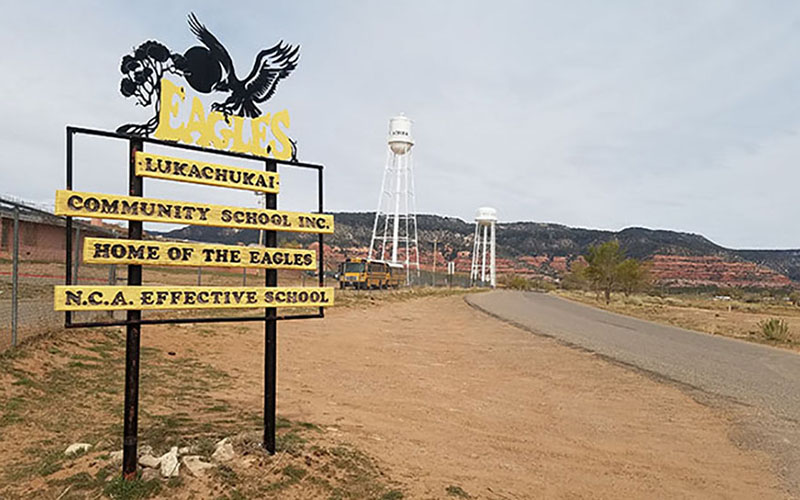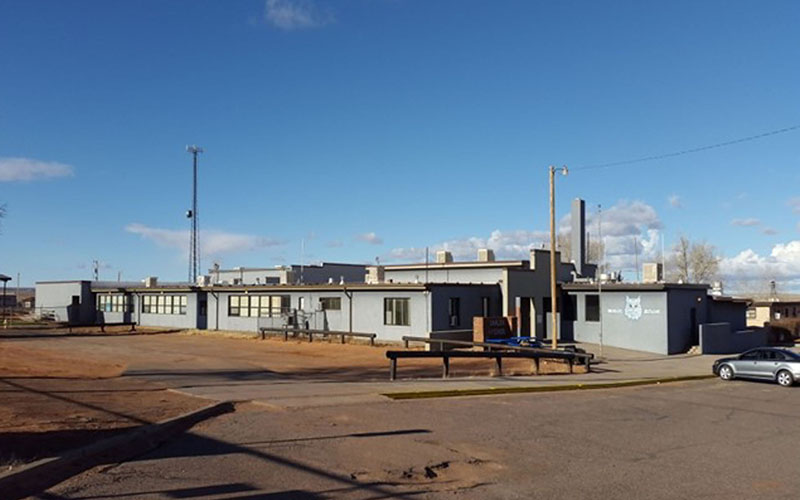
Lukachukai Community School, a Navajo Nation school on the priority list for replacement. Officials said schools may have problems with lead, asbestos, mold, “you name it.” (Photo courtesy Lukachukai Community School)

Schools on the Bureau of Indian Education priority list for replacement are only in the first phase of what can be a years-long process of getting school repairs. (Photo courtesy Tonalea Redlake Elementary School)

Tonalea Redlake Elementary School was one of seven in the Navajo Nation on the Bureau of Indian Education’s priority list for replacement out of just 10 nationally. (Photo courtesy Tonalea Redlake Elementary School)
WASHINGTON – Half of the 10 schools on the Bureau of Indian Education priority replacement list released this week are in Arizona, while another three are on the New Mexico portion of the Navajo Nation.
Making the list is just the first step in a process that can take years before a school is replaced – if Congress approves money for construction. Schools on the list start the planning process, but then join a backlog of 50 to 60 schools listed in past years.
Navajo Nation Schools Superintendent Tommy Lewis said the announcement was “a good thing for Indian Country,” but he added that many more schools could use help.
“There’s still more out there that have a dire need for replacement,” he said. “There’s a lot of wear and tear in them. Some of them are unsafe for children to be in.”
Priority disparity
Of the 10 schools on a Bureau of Indian Education priority list for replacement, eight are in Arizona or on Navajo land in New Mexico.
Arizona schools:
Navajo schools in New Mexico:
Lewis said problems range from physical decay to the presence of asbestos, lead, mold, “you name it.”
In order to be considered for the list, schools must get a “poor” rating on the facility condition index or be 50 years old and have at least 75 percent of students in portable classrooms. The bureau said 78 of its 183 schools met those criteria and 53 applied for replacement. They were narrowed to the final 10, according to the Interior Department.
“The release of the list is a necessary step forward in ensuring that students have access to quality education,” said Lawrence Roberts, the acting assistant secretary for the Bureau of Indian Affairs, during a Senate Indian Affairs Committee hearing Wednesday.
“The next step is to secure funding to replace those schools and we look forward to continuing to work with all of you (the committee) on that issue,” he said.
Lewis said schools can be stuck on the list for five or 10 years and described the list process as “piecemealing.” The Navajo Nation got funding earlier this year for two schools, Cove Day and Little Singer Community School, that were listed in 2004.
The Interior Department said the order of school replacement is determined by overall condition and “shovel-readiness.” Federal officials work with the schools to gather a preliminary estimate of the design and construction needs, which is used to request a budget from the Senate Indian Affairs committee.
Senators on that committee criticized the process Wednesday.
Sen. Maria Cantwell, D-Washington, said “there’s too much mystery” around what it takes to make the list, and when schools actually get repairs.
Sen. Jon Tester, D-Montana, said there are still “way too many” BIE schools in poor conditions. He stressed the need for a long-term plan, pointing to his bill that would require a 10-year plan to bring schools up to good conditions.
“We can’t make another generation of Native students wait for us to get our act together,” Tester said.
See related story:
Begay urges Senate panel to back bill giving Native children school choice
“The bottom line is at a lot of these schools, you could be a top-notch student but the conditions aren’t there to learn,” he added. “You could be a top-notch teacher but the classrooms just are not adequate.”
Roberts said the bureau is awaiting a report on how it can bring schools from poor to good condition in the next five years. The report, which the bureau expects in the next 60 days, will also provide suggestions on a long-term plan.
By the end of the hearing, Cantwell asked Roberts if he thought the priority list process was working.
He conceded that “there’s been a lot of criticism of the process. We’re fixing it is the short answer.”
In the meantime, the bureau is working with the priority list.
“We do have a crisis here, we have to move forward quickly,” Roberts said during the hearing. “Obviously that’s going to take appropriations as well.”